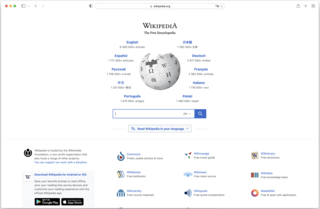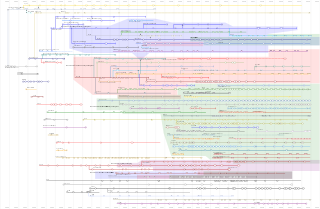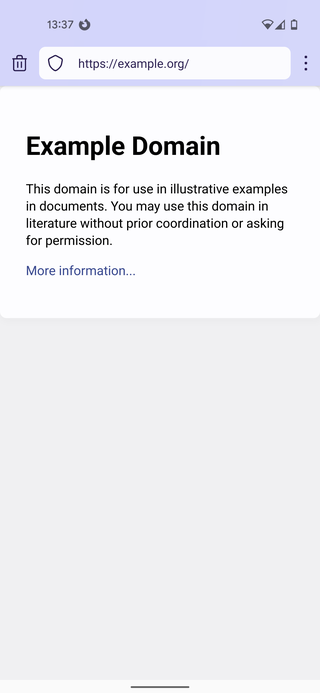
A web browser is an application for accessing websites and the Internet. When a user requests a web page from a particular website, the browser retrieves its files from a web server and then displays the page on the user's screen. Browsers are used on a range of devices, including desktops, laptops, tablets, and smartphones. In 2020, an estimated 4.9 billion people have used a browser. The most used browser is Google Chrome, with a 65% global market share on all devices, followed by Safari with 18%.
Gecko is a browser engine developed by Mozilla. It is used in the Firefox browser, the Thunderbird email client, and many other projects.

Mozilla Thunderbird is free and open-source email client software which also functions as a full personal information manager with a calendar and contactbook, as well as an RSS feed reader, chat client (IRC/XMPP/Matrix), and news client. Available cross-platform, it is operated by the Mozilla Foundation's subsidiary MZLA Technologies Corporation. Thunderbird is an independent, community-driven project that is managed and overseen by the Thunderbird Council, which is elected by the Thunderbird Community. The project strategy was originally modeled after that of Mozilla's Firefox web browser and is an interface built on top of that web browser.

A browser war is a competition for dominance in the usage share of web browsers. The "first browser war," (1995–2001) pitted Microsoft's Internet Explorer against Netscape's Navigator. Browser wars continued with the decline of Internet Explorer's market share and the popularity of other browsers including Firefox, Google Chrome, Safari, Microsoft Edge and Opera.
This is a comparison of both historical and current web browsers based on developer, engine, platform(s), releases, license, and cost.

Minimo was a project to create a version of the Mozilla web browser for small devices like personal digital assistants and mobile phones.

Winifred Mitchell Baker is the Chairwoman of the Mozilla Foundation and CEO of Mozilla Corporation, a subsidiary of the Mozilla Foundation that coordinates development of the open source Mozilla Internet applications, including the Mozilla Firefox web browser.
In computing, spatial navigation is the ability to navigate between focusable elements, such as hyperlinks and form controls, within a structured document or user interface according to the spatial location.

The Mozilla Corporation is a wholly owned subsidiary of the Mozilla Foundation that coordinates and integrates the development of Internet-related applications such as the Firefox web browser, by a global community of open-source developers, some of whom are employed by the corporation itself. The corporation also distributes and promotes these products. Unlike the non-profit Mozilla Foundation, and the Mozilla open source project, founded by the now defunct Netscape Communications Corporation, the Mozilla Corporation is a taxable entity. The Mozilla Corporation reinvests all of its profits back into the Mozilla projects. The Mozilla Corporation's stated aim is to work towards the Mozilla Foundation's public benefit to "promote choice and innovation on the Internet."

Firefox for Android is a web browser developed by Mozilla for Android smartphones and tablet computers. As with its desktop version, it uses the Gecko layout engine, and supports features such as synchronization with Firefox Sync, and add-ons.

Clickjacking is a malicious technique of tricking a user into clicking on something different from what the user perceives, thus potentially revealing confidential information or allowing others to take control of their computer while clicking on seemingly innocuous objects, including web pages.

Mozilla Firefox 3.5 is a version of the Firefox web browser released in June 2009, adding a variety of new features to Firefox. Version 3.5 was touted as being twice as fast as 3.0. It includes private browsing, has tear-off tabs, and uses the Gecko 1.9.1 engine. It was codenamed Shiretoko during development, and was initially numbered Firefox 3.1 before Mozilla developers decided to change the version to 3.5, to reflect the inclusion of a significantly greater scope of changes than were originally planned. It is the last major version to support X BitMap images.
The W3C Geolocation API is an effort by the World Wide Web Consortium (W3C) to standardize an interface to retrieve the geographical location information for a client-side device. It defines a set of objects, ECMAScript standard compliant, that executing in the client application give the client's device location through the consulting of Location Information Servers, which are transparent for the application programming interface (API). The most common sources of location information are IP address, Wi-Fi and Bluetooth MAC address, radio-frequency identification (RFID), Wi-Fi connection location, or device Global Positioning System (GPS) and GSM/CDMA cell IDs. The location is returned with a given accuracy depending on the best location information source available.

Firefox OS is a discontinued open-source operating system – made for smartphones, tablet computers, smart TVs, and dongles designed by Mozilla and external contributors. It is based on the rendering engine of the Firefox web browser, Gecko, and on the Linux kernel. It was first commercially released in 2014.
Firefox was created by Dave Hyatt and Blake Ross as an experimental branch of the Mozilla browser, first released as Firefox 1.0 on November 9, 2004. Starting with version 5.0, a rapid release cycle was put into effect, resulting in a new major version release every six weeks. This was gradually accelerated further in late 2019, so that new major releases occur on four-week cycles starting in 2020.
Mozilla is a free software community founded in 1998 by members of Netscape. The Mozilla community uses, develops, publishes and supports Mozilla products, thereby promoting exclusively free software and open standards, with only minor exceptions. The community is supported institutionally by the non-profit Mozilla Foundation and its tax-paying subsidiary, the Mozilla Corporation.
Mozilla Location Service (MLS) is an open geolocation service which allows devices to find their position by processing their received signals of publicly observable radio transmitters: cellular network antennae, Wi-Fi access points, and Bluetooth beacons. The service is provided by Mozilla since 2013. The service uses Mozilla's open source software project called Ichnaea.

Firefox Focus is a free and open-source privacy-focused mobile browser based on Firefox from Mozilla, available for Android and iOS smartphones and tablets. Firefox Focus was initially a tracker-blocking application for mobile iOS devices, released in December 2015. It was developed into a minimalistic web browser shortly afterwards. However, it can still work solely as a tracking-blocker in the background of the Safari browser on Apple devices.










